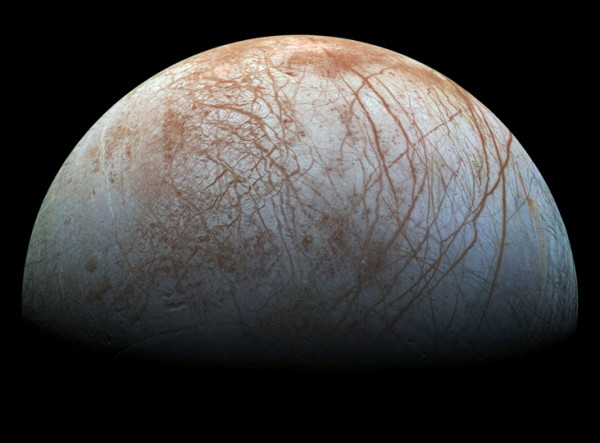By Ana Verayo, | September 22, 2016

Europa, a moon of Jupiter, appears as a thick crescent in this enhanced-color image from NASA's Galileo spacecraft, which has been orbiting Jupiter since 1995.
NASA will be releasing an official statement about some "surprising activity" on the Jupiter moon, Europa, next week.
The space agency will host a teleconference on Monday, September 26 where mission scientists will reveal their new findings that will include new imagery captured by the Hubble Space Telescope.
Like Us on Facebook
Scientists have suggested in past studies that Europa possesses a hidden subsurface global ocean.
NASA scientists claim that this liquid ocean exists under Europa's icy crust. More specifically, the briny water is hiding under a thick layer of ice measuring 10 to 15 miles in the moon's interior.
This liquid ocean is generated due to tidal heating as tidal forces from Jupiter's powerful gravitational pull causes the moon to stretch and flex, creating energy within. As Europa's core becomes warmer, its liquid ocean remains fluid instead of becoming frozen all the way through.
This subsurface ocean on Europa is could potentially host microbial life. NASA's next goal is to launch a lander on the surface of Europa, to investigate and study this ocean and to identify the composition of the ocean along with its surface geology.
The main focus of the mission is not hunting for extraterrestrial and underwater life, according to mission scientists at the Jet Propulsion Laboratory.
Early this year, NASA released new findings of how Europa's subsurface ocean can possess similar features to oceans on Earth; specifically its chemical compositions could consist of oxygen and hydrogen compounds. This could mean that it can support life.
Scientists have revealed in that Europa possesses a high flux of oxidants in its ocean. Due to Europa's large and consistent fluxes of oxygen and hydrogen, it can be habitable despite being icy on the surface.
-
Use of Coronavirus Pandemic Drones Raises Privacy Concerns: Drones Spread Fear, Local Officials Say

-
Coronavirus Hampers The Delivery Of Lockheed Martin F-35 Stealth Fighters For 2020

-
Instagram Speeds Up Plans to Add Account Memorialization Feature Due to COVID-19 Deaths

-
NASA: Perseverance Plans to Bring 'Mars Rock' to Earth in 2031

-
600 Dead And 3,000 In The Hospital as Iranians Believed Drinking High-Concentrations of Alcohol Can Cure The Coronavirus

-
600 Dead And 3,000 In The Hospital as Iranians Believed Drinking High-Concentrations of Alcohol Can Cure The Coronavirus

-
COVID-19: Doctors, Nurses Use Virtual Reality to Learn New Skills in Treating Coronavirus Patients







